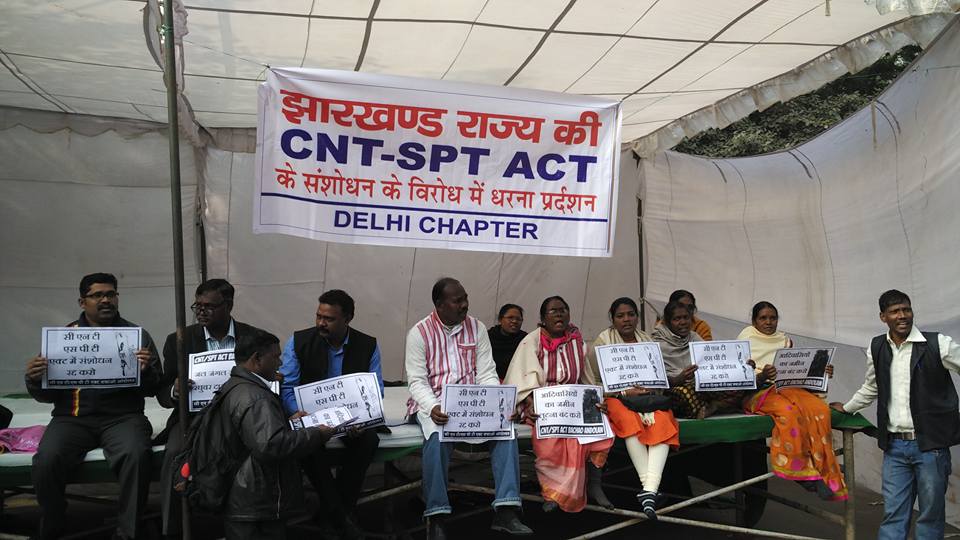"We Shall Not Part With our Land": Jharkhand Tribals Protest Against CNT-SPT Act Amendments

NEW DELHI: Political organisations and tribal groups in Jharkhand have been protesting, for weeks now, against new amendments that have been brought about by the BJP-led Raghubar Das’ government to dilute the Chotanagpur Tenancy Act, 1908 and Santhal Paragana Tenancy Act, 1949.
The Chotanagpur Tenancy (CNT) and Santhal Paragana Tenancy (SPT) Amendment Bill 2016, which was passed on November 23 was to ease the transfer of lands owned by Scheduled Tribes, Scheduled Castes and Backward Classes, including the conversion of agricultural lands to commercial use to boost trade, investment and revenue. The Amendments cut into the original provisions.
The protests erupted weeks before the bill was tabled in State Assembly in Ranchi led by the Jharkhand Mukti Morcha (JMM), Congress, Jharkhand Vikas Morcha and others . Interestingly, All Jharkhand Student Union (AJSU), a part of the NDA government has also joined the statewide strikes calling the amendment “anti-tribal” and “anti-Jharkhand.”
Several prominent faces of BJP-Jharkhand have voiced their concerns against the bill that has already been ratified by the Cabinet and sent to the President for his approval. The brouhaha in the Assembly—not very uncommon in Jharkhand, saw leaders of opposition hurling chairs and shoes at the Speaker and tearing controversial passages of the Bill; the government said that “unparliamentary behaviour shall not be tolerated in the House and the defaulters shall be strictly penalised.”
“The protests are about the very existence of the tribals in Jharkhand. The BJP-led government has turned deaf ears to voices against these amendments, and CM Raghubar Das has become so arrogant that he fails to recognise the dissenting voices of his party members, let alone the opposition,” Vinod Kumar Pandey, General Secretary of JMM saod. Attacking AJSU for its “double standards,” he said that the party must come clean on its stands: “AJSU raises its voice in front of media and outside the Assembly, but inside they are complicit in passing anti-tribal laws.” JMM has however expressed solidarity with the dissenting voices in the BJP who have been speaking against the amendments.
The statewide strike that was observed on November 25 saw most of Jharkhand coming to a halt. Congress, Janta Dal United (JDU), Jharkhand Dishom Party, Rashtriya Janta Dal (RJD) and political groups like CNT Bachao Morcha and Chotanagpur Working Women’s Society have joined the agitation, and JMM’s call for “bringing Jharkhand to a standstill as long as the amendments are not repealed.”
On Saturday, December 10 the Delhi Chapter of CNT SPT Bachao Andolan staged a protest at Jantar Mantar. Around a hundred people who participated in the protest meeting took turns to criticise the amendments.
Phoolkeria Minz, the President of the Chotanagpur Working Women’s Society who started with a tribal song from the state that called for unity amongst people who have been divided by those in power, moved on to deliver a passionate speech where she questioned the nexus of the government and capitalists: “The rights of the oppressed, the marginalised are been overlooked. The industrialists come and take away our lands, and this is taking place with the connivance of the BJP government.”
Decrying the human rights violations in the tribal regions of the country, she exhorted the crowd to fight for their lands till death.
“… the land belongs to our ancestors , the land is made up of ashes of our forefathers, we shall die but not let the government take it away from us. The BJP has goaded the tribals like animals, we shall now rise like tigers to defend our territory.”
A handful of students who had joined the protest presented songs of tribal resistance. One of the songs, called Ladaai Chorab Nahi (the struggle shall go on) championed the idea of resistance to repression:
Gaon chorab nahi, jungle chorab nahi, (We shall not live our villages and our forest,) Mae mati chorab nahi, ladai chorab nahi. (We shall not part with our lands, the struggle will go on.)
Anubhuti Agnes Bara, a PhD student at Jawaharlal Nehru University emphasised on the relevance of the song amidst growing rates of migration of tribals from their native lands to cities, leading to a vicious cycle of exploitations and no escape.
Another student, Dawa Sherpa from Nagaland focused on the history of land laws and brought into light the similarities of tribal oppression in Jharkhand, Orissa, Madhya Pradesh, and the north-east. He questioned the high-handedness of the state government and raised the dichotomy between current dispensation and the British-rule.
He observed: “Historic rebellions by the Adivasis were successful in the enforcement of three legislations—CNT, 1908, Wilkinson’s Rules 1837 and SPTA, 1949; these were not handouts by the British. The current CM wants to take away these rights for which tribal men and women have sacrificed their lives. We must judge: which system is more oppressive for us?”
Several other speakers talked about the relation between Adivasis and land and on how land is a symbol of power, and that “state of landlessness” is a “state of powerlessness.”
A memorandum was later read out that listed the demands of the protestors and is supposed to be sent to the President of India. Apart from the with drawl of the amendments, the memorandum also seeks the release of protestors in jail in Jharkhand and the inclusion of three key areas under the purview of tenacity laws. The memorandum collected around two hundred signatures.



